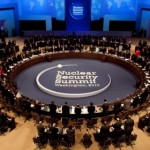President Barack Obama will host leaders of more than 50 countries, including India, for the fourth and final Nuclear Security Summit (NSS) this week, in an attempt to produce concrete action plans to better safeguard nuclear materials from terrorists.
It is expected that Prime Minister Narendra Modi will come bearing “house gifts” or pledges to further improve nuclear security at home as a way to strengthen India’s credentials as a responsible nuclear weapons power and improve its chances to enter the Nuclear Suppliers Group later this year.
Russia, an important player, however, will not attend. It is seen as a setback but Moscow’s decision was unsurprising given the frosty state of its relations with the United States. The Russian foreign ministry said it doubted the value of the summit, adding that Russia intends to focus on improving nuclear safety through the International Atomic Energy Agency (IAEA), which is also holding a similar conference this year.
While Moscow’s absence will no doubt be felt, the gathering has assumed greater significance than ever in light of the terrorist attacks in Brussels. Last year, after the Paris bombings in November, the Belgian police came across a video in the house of a suspect which showed a senior researcher at a Belgian nuclear center.
Police speculated that it could have been part of a terrorist plot to obtain nuclear materials from the scientist by kidnapping him or compromising him in other ways. Belgian authorities immediately sent troops to secure their nuclear facilities, which, until then, were guarded by a private security firm.
There have been other breaches of nuclear facilities in different countries, including the United States. In 2012, three peace activists entered a nuclear plant in Oakridge, Tennessee, while a year later US officers were found sleeping with a blast door open to their missile launch control capsule.
It is clear the importance of securing the nearly 1,800 metric tons of highly enriched uranium and plutonium spread around thousands of nuclear sites can’t be overstated.
Since Obama’s speech in Prague in 2009, in which he outlined his nuclear security agenda, and the first NSS a year later, progress has been recorded. The number of countries with nuclear material, which could be used to make weapons, has come down from 35 to 24, largely through voluntary actions and commitments.
But the larger state of the global nuclear security architecture remains inadequate and nuclear experts want this summit to create a sense of urgency and empower implementing UN bodies further to continue the work.
The Nuclear Threat Initiative (NTI), a widely respected nonpartisan organization that works to improve nuclear security, said ahead of the summit that progress had stalled and the “global nuclear security system remains woefully underdeveloped.” It urged the leaders to recognize the “consequences of inaction.” They must look forward and not focus merely on completing the old agenda.
In other words, they must rise to “emerging challenges” and learn to expect the unexpected and be proactive. NTI’s latest Nuclear Threat Index, which ranks countries on how they secure their deadly materials, warned that the “threat environment has worsened” with the rise of terrorist groups such as the ISIS – a group that has already reportedly used chemical weapons.
The 2016 Threat Index for the first time checked preparedness of countries for cyber attacks and found that nearly half the countries had no mechanisms in place to protect their nuclear facilities from cyber threats. Only nine out of 24 countries with weapons-usable material got the highest score on cybersecurity.
India scored a high 86 on “response capabilities” and 75 on cybersecurity, both scores above the average of 66. But it got only 67 on domestic nuclear security legislation, a point below the average scores. On “insider threat prevention,” India received 33 and 25 on “pervasiveness of corruption” – both below average scores. On the threat of sabotage, both India and Pakistan get 54 points while China got 59.
India’s overall score has improved somewhat from 44 to 46 while Australia remained the most secure for the third time running, scoring 93 on the scale of 0-100 where 100 is seen as most satisfactory. The United States received an overall ranking of 80 while Pakistan got 42 and China 60.
The only perfect score India gets is on “global norms” and on implementation of UN Security Council resolution 1540 passed in 2004, which established legally binding obligations on all UN member states to create and enforce effective measures against the proliferation of nuclear, chemical and biological weapons and their delivery systems.
Incidentally, the Indian government does not recognize the NTI or its index, saying it is a private initiative based largely on guesswork and opinion. Indian officials say that no country would discuss its nuclear stockpiles in any meaningful detail with private assessors.
But in the wider nuclear world, the threat index developed jointly by NTI and The Economist Intelligence Unit, is taken seriously and remains one of the more reliable databases of nuclear materials. Interestingly, a former Indian ambassador, Sheel Kant Sharma, is one of the experts who worked on the index.
The challenge is primarily for the bureaucrats to continue working and keep the leaders engaged after this summit. Inertia on this issue could be deadly.
Seema Sirohi is a Washington-based analyst and a frequent contributor to Gateway House: Indian Council on Global Relations. Seema is also on Twitter, and her handle is @seemasirohi
This article was exclusively written for Gateway House: Indian Council on Global Relations. You can read more exclusive content here.
For interview requests with the author, or for permission to republish, please contact outreach@gatewayhouse.in.
© Copyright 2016 Gateway House: Indian Council on Global Relations. All rights reserved. Any unauthorized copying or reproduction is strictly prohibited


